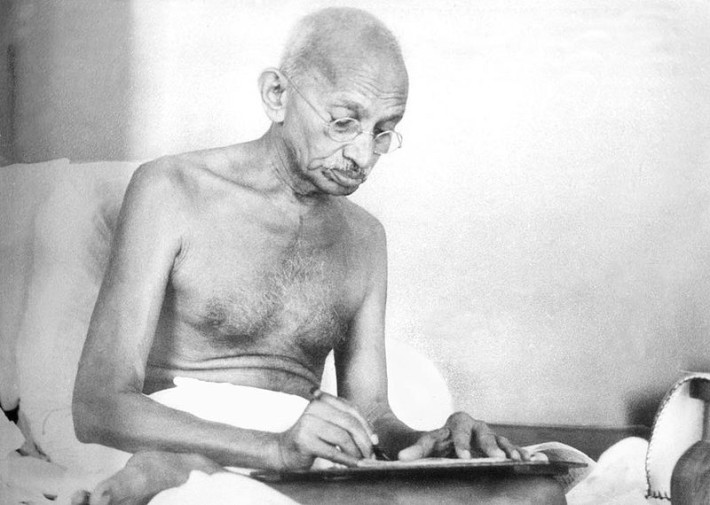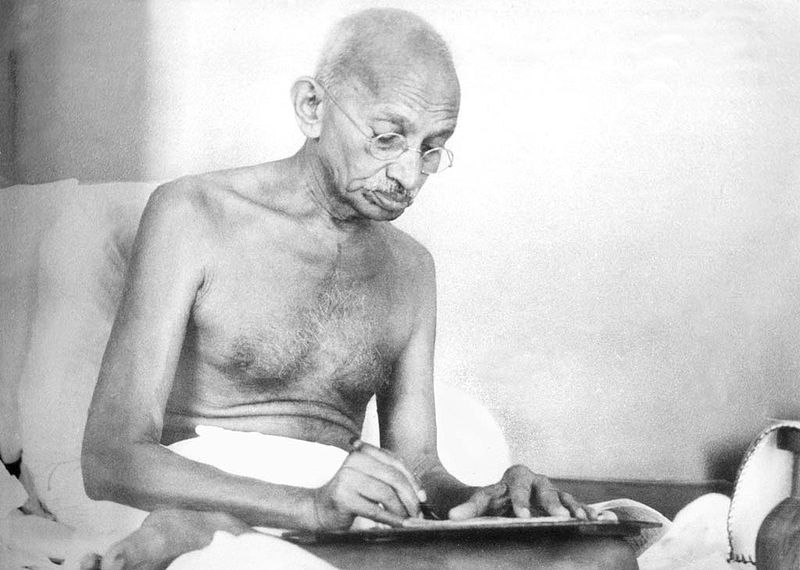Writing lessons from Gandhi: Naming the blogging barriers

This month marks over five years and 192 posts since I first hit publish on Sideways Thoughts. I find myself borrowing on Gandhi to help in my reflections.
Gandhi shared about his approach to writing in his autobiography Experiments in Truth. Gandhi’s autobiography reads like a blog, with 160 short chapters about various aspects of his life. Some “posts” are about his activities and others focus on his observations and beliefs. Gandhi devoted some of these observations to his reflections on his writing, which provide lessons for writers today.
There are many reasons why a person would want to write. These generally fall into one of four categories: 1) sharing information with others, 2) as a means of creative expression, 3) learning through the process of writing about topics of interest and self-reflection, and 4) leading through promoting a point of view. Every blogger at some point weighs the gap between these benefits and perceived barriers.
Two barriers often raised are technology and time, although these may act as justifications for more subjective doubts. Technology is becoming less a factor, as platforms such as Medium, WordPress, Tumblr and Blogger make blogging easier than ever. Another barrier I often hear is time, but perhaps the issue is more time needed to overcome doubts rather than time to devote to writing.
The barriers to blogging I have most encountered are psychological, wrapped up in beliefs and self-talk. These doubts can come in several versions. Gandhi shared one particular writing doubt expressed by one of his friends:
“Supposing you reject tomorrow the things you hold as principles today, or supposing you revise in the future your plans of today, is it not likely that the men who shape their conduct on the authority of your word, spoken or written, may be misled?”
Writing is a public expression of our self-image. Our “self” changes and evolves. I reflect how my position now is different than it was when I started five years ago, and I expect it will evolve again over the next five years. Writing becomes an acknowledgment that we will change and grow and an acceptance that all we can offer is confidence of who we are in the moment. This provides for a vulnerability expressed by Gandhi:
“The more I reflect and look back on the past, the more vividly do I feel my limitations.”
If the goal of writing is wrapped up in our self, then public writing can produce arrogance or result in dependency and need for approval. Alternatively, writing for a purpose that is separate to our self can result in humility. The humble writer is secure in her or his position but intimately aware of their place in pursuing the purpose to which they have been called. As Gandhi notes,
“The seeker after truth must be humbler than the dust. The world crushes the dust under its feet, but the seeker after truth should so humble himself that even the dust could crush him.”
Part of this humility can present another barrier to blogging, that of the multitude of writers who have gone before. I have long held the belief that while it may have been written, it had not yet been written by me. This is not a position of self-importance, but of acknowledging the value of the choir of perspectives.
If I share a dominant position that has value, than it bears to be reinforced. If I share a position that is contrary to what is widely accepted, than that position bears to be challenged. Either way, my hope is that my views help develop the position of the reader. It is then not my task but that of the reader to consider the various perspectives and in their own way make their positive impact on humanity. Gandhi examines this process below:
“A writer almost always presents one aspect of a case, whereas every case can be seen from no less than seven points of view, all of which are probably correct by themselves, but not correct at the same time and in the same circumstances. And then many books are written with a view to gaining customers and earning name and fame. Let those, therefore, who read such books as these do so with discernment, and take experiments set forth, or let them read the books with patience and digest them thoroughly before acting upon them.”
In short, we should write for good, and let the reader decide. Our purpose in writing needs to come from within, not defined by the whims of external judgments.
“The sole aim of journalism should be service. The newspaper press is a great power, but just as an unchained torrent of water submerges whole countrysides and devastates crops, even so an uncontrolled pen serves but to destroy. If the control is from without, it proves more poisonous than want of control. It can be profitable only when exercised from within. If this line of reasoning is correct, how many of the journals in the world would stand the test? But who would stop those that are useless? And who should be the judge? The useful and the useless must, like good and evil generally, go on together, and man must make his choice.”
Writing from an authentic position does not mean that you will always have a plan in mind. Some posts will reflect my direction, while other posts may likely reflect my distraction. After five years, I continue to explore a diverse range of topics as I seek after truth in how we might best understand ourselves and interact with each other. I expect my posts will continue to evolve as I learn and experience life.
“When I began writing it, I had no definite plan before me. I have no diary or documents on which to base the story of my experiments. I write just as the Spirit moves me at the time of writing. I do not claim to know definitely that all conscious thought and action on my part is directed by the Spirit. But on an examination of the greatest steps that I have taken in my life, as also of those that may be regarded as the least, I think it will not be improper to say that all of them were directed by the Spirit.”
With this approach, I can be assured to not always get it right. I will, however, continue to learn as I seek after truth both in myself and in the world.
“But so long as there is no prohibition from the voice within, I must continue the writing. I must follow the sage maxim that nothing once begun should be abandoned unless it is proved to be morally wrong.”
The internal purpose for an external cause combined with a permission to learn mitigates an obsession for the opinions of other people that can stop the writing process. Each post then becomes an experiment, the result to which I can only hope that I will learn and that others find value. As Gandhi notes,
“I am not writing the autobiography to please critics. Writing it is itself one of the experiments with truth.”
And yet public writing is not done exclusive of the reader. Without interaction between the reader and the writer, I may as well keep a private journal or have a conversation with myself. Even before social media, Gandhi acknowledged the value of feedback in his own growth and encouragement.
“For me it became a means for the study of human nature in all its casts and shades, as I always aimed at establishing an intimate and clean bond between the editor and the readers. I was inundated with letters containing the outpourings of my correspondents’ hearts. They were friendly, critical or bitter, according to the temper of the writer. It was a fine education for me to study, digest and answer all this correspondence. It was as though the community thought audibly through this correspondence with me. It made me thoroughly understand the responsibility of a journalist, and the hold I secured in this way over the community made the future campaign workable, dignified and irresistible.”
I believe that writing without evidence of personal growth is empty. No one who writes has “arrived”. In the current framework of social media, however, writing can easily become an expression of ego.
This brings us to the last barrier in my reflection, that of a realisation of the futility of it all. I consider the amount of time I spend crafting my words, corralling my disparate thoughts into some semblance of order. The investment of time is a waste if it is not supported by action.
I am unable to say it any more clearly than Gandhi:
“My writings should be cremated with my body. What I have done will endure, not what I have said or written.”
Thank you for being a part of the journey. I invite you to join me in a pursuit of truth that will allow our collective Sideways Thoughts to stir feelings and prompt action. I welcome your comments if part of that action includes leaving a note below.


One of your best.
.Perhaps that’s only because I agree with it all…
But I offer this subjective truth, for what it’s worth: Both thumbs up.
Thanks Kevin. 🙂
Hi Chad,
This is not the first time I read you blog; I have found this and some of your other posts I’ve recently read, very inspirational and helpful in my personal projects. Thanks again for taking the time to share your Sideways thoughts.
PS: As highlighted in this post feedback is an important mechanic in public writting, and considering that your blog has it in the form of Social Media/email and Comments, have you considered expand the feedack you collect/provide by including somewhere: number of views & heart-ings (a non facebook version of Likes)? I can see some benefits on it #JustSaying 🙂
Thanks Again
Juan
Hi Juan,
Thank you for the feedback, I am glad you have found value in the posts!
I will have a look at some plugins to offer the likes and number of views. Good idea!
Chad
Thanks for presenting the thoughts about blogging from Gandhiji’s point of view. I feel writing is all about making the reader feel about the value of content shared and making them realize about some issue in serious terms.